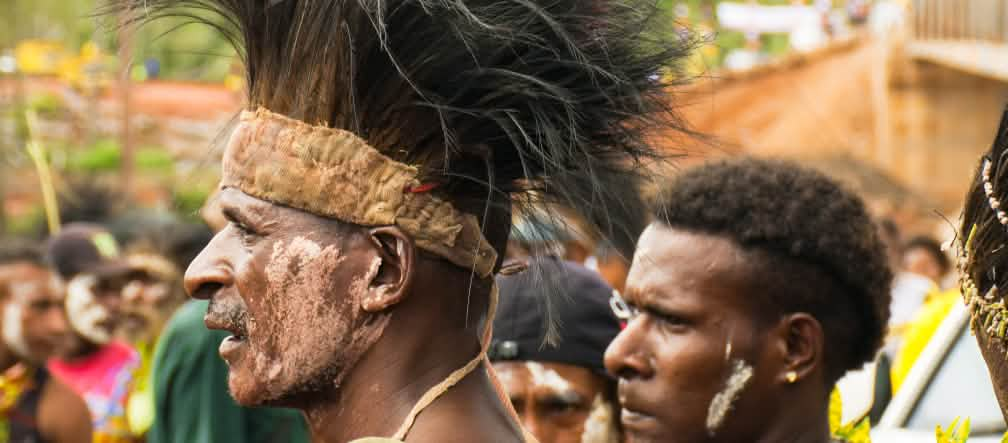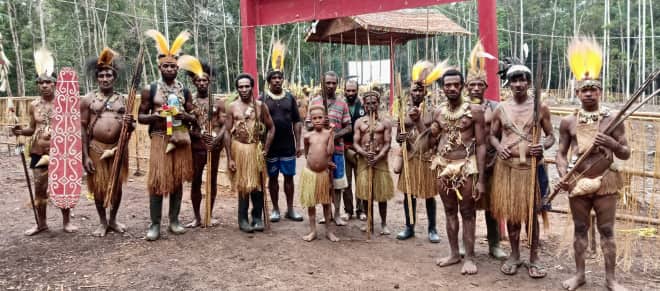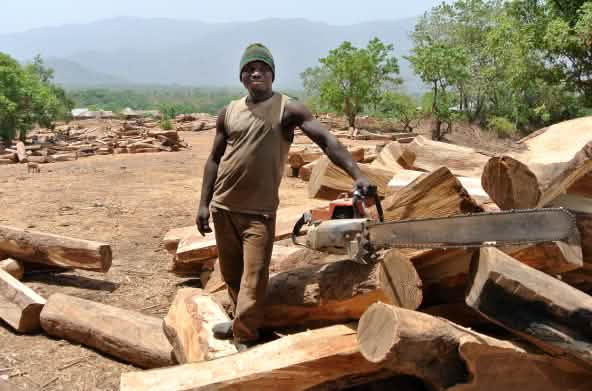
Completed campaign
Papua: “Surrendering our land would be suicide”
Indonesia’s President Widodo took office in 2014 promising to protect forests and respect the rights of indigenous people. Now he wants to turn 1.2 million hectares of rainforest and indigenous land in Papua into industrial plantations. Let’s remind him of his election promise!
News and updatesTo: the President of the Republic of Indonesia, Joko Widodo
“Scrap the industrial agriculture projects in Merauke. Protect the forest and the rights of Papua’s indigenous people.”Over the next three years, 1.2 million hectares in Merauke, Papua, would be turned into industrial rice plantations featuring state-of-the-art technology. “We will make Merauke into the rice bowl of Indonesia and the world,” President Widodo proclaimed. “We have millions of hectares at our disposal!” In the medium term, no less than 4.6 million hectares of rice plantations may be realized.
What he did not say is that all of Merauke would disappear under rice paddies. It would spell the end for a unique ecosystem of rainy and dry forests, wetlands, savannas and mangroves. The traditional culture and way of life of the 70,000 indigenous Malind, who live scattered throughout the forest and cultivate sago palms and farm small plots, would also vanish.
We live off of the forest and sago, not rice,” says a village elder. “Surrendering our land would be suicide. Without it, there will be no place for our children and grandchildren.”
The Malind families have good reason to be alarmed by the new plans: the Merauke Integrated Food and Energy Estate (MIFEE), an industrial-scale agricultural project, has been taking shape since 2010. In only four to five years, more than one million hectares – a quarter of the district – fell into the hands of agricultural corporations that are clearing the land for oil palms, sugarcane and eucalyptus.
President Joko Widodo took office promising to protect the forests and respect the rights of indigenous people. Call on him to keep his promise and preserve Papua’s unique natural landscapes.
Papua and Merauke
New Guinea is the second largest island in the world. The eastern part is the independent state of Papua New Guinea, while the western part has been governed by Indonesia since 1962. The Indonesian part consists of the provinces of West Papua and Papua.
With 4.5 million hectares, Merauke in southeastern Papua is Indonesia’s largest district. The population is about 300,000, which amounts to a population density of 0.7 inhabitants per square kilometer. Figures for the number of indigenous Papuans living there vary from 50,000 to 80,000, putting the ratio of recent arrivals to Papuans at approximately four to one.
Merauke is home to several Malind ethnic groups that live off of sago, small garden plots, fruit gathered from the forest and hunting.
Like other districts in Papua, Merauke is marked by an almost complete lack of infrastructure, poor schools and patchy healthcare services.
The entire economy of the region is dominated by outsiders. Merauke was a destination area of Indonesia’s transmigration program and villages for settlers from Java and other islands were established close to the border to Papua New Guinea in particular. Furthermore, the region has a strong military presence. Economic exploitation and the dominance of the military are leading to the marginalization of indigenous Papuans.
Palm oil in Papua
Palm oil was not a factor in Papua until very recently. While there were a number of small plantations, their productivity was low and their economic significance negligible. It was not until numerous industrialized nations put biofuels policies in place that Big Agriculture took Papua in its sights.
Responding to the palm oil boom, the government in Jakarta spoke in 2006 of twenty million hectares of oil palm plantations by 2025. Half of those plantations are being developed in Kalimantan on Borneo (ten million hectares), while seven million hectares are located in the Indonesian part of Papua. According to the Ministry of Agriculture, jatropha, tapioca, sago and sugarcane plantations are to be developed on a similar scale for the production of ethanol in areas including Papua.
Update: Since 2023, Papua has been divided into six provinces. Papua, Papua Barat, Papua Tengah, Papua Selatan, Papua Pegunungan and Papua Barat Daya. Merauke district is now part of Papua Selatan province (South Papua).
Big Agriculture is particularly interested in Merauke’s broad river floodplain. “The EU market is calling the shots, and here is where the plantations will be established,” explains former district chief John Gluba Gebze. The palm oil boom truly took off in Merauke in early 2007, with the district granting far-reaching concessions in its forests.
The plan to make Merauke a center for industrial agriculture took shape in 2009 with the Merauke Integrated Food and Energy Estate (MIFEE) – and with it, the onslaught began in earnest.
MIFEE – Merauke Integrated Food and Energy Estate
MIFEE, an industrial-scale agriculture project that is expected to produce palm oil for the energy sector and rice for food, was officially launched in 2010. MIFEE is the largest and most important business undertaking in Indonesia. Dozens of Indonesian and other Asian corporations are involved, often resorting to deceitful methods to acquire land or simply grabbing it with the backing of the military. Any resistance they encounter is dealt with harshly, and more than a quarter of the district is already in corporate hands.
MIFEE not only threatens the forest and other ecosystems, it seriously endangers the existence of indigenous people, who suffer land grabbing, marginalization and discrimination. While local people are standing up to the land grabs and criminal methods of the intruding corporations and protesting the clear-cutting of their forests, to date the resistance has usually been broken, often by the ever-present military.
This raises serious questions about why Indonesian President Joko Widodo is breaking his campaign promises to protect forests and strengthen indigenous rights in such a dramatic manner.
Widodo’s food program or Merauke as a rice bowl
The Indonesian government aims to establish 1.2 million hectares of rice plantations in Merauke in just three years. The key to this development will be mechanized industrial agriculture, not the promotion of smallholders.
The necessary investment is expected to come both from government coffers and the private sector. The project will be realized by the state-owned enterprise Pupuk Indonesia Holding through PT Pangan, a company newly created for the purpose. 750,000 hectares are to be allocated to PT Pangan, the Ministry of Agriculture will be responsible for 250,000 hectares and the remaining 200,000 hectares will go to private corporations.
The mega rice project is only a part of the MIFEE program (2010-2030). On paper, MIFEE focuses on food and energy, but mainly fuel crops (oil palms and sugarcane) have been planted to date.
The food program has a high political priority. Most rice in Indonesia is cultivated on fertile volcanic soil in Java and Bali, islands that are also home to the majority of the population. Yet overuse, land use change, soil degradation and population growth have forced Indonesia has to import rice, a staple food.
The plan is for Merauke to account for 30% of the national rice harvest (2014: 70 million tons). Mechanization is supposed to double productivity from four to eight tons per hectare, for a total of 24 million tons per year.
The plantations are to be extended to 4.6 million hectares in the medium term – an area larger than the entire district. At present, 266,274 hectares of oil palm and 579,563 hectares of sugarcane plantations for the biofuels sector and 593,942 hectares of timber plantations for the paper industry have been set up under the MIFEE project. Rice, sweet potatoes, peanuts and other food crops are being grown on 69,883 hectares. According to NGOs on the ground, the remainder – nearly three million hectares – is still forest.
This raises the question of where the vast rice plantations, which are slated to initially occupy 1.2 million hectares, will be established. Since it is extremely unlikely that existing oil palm and sugarcane plantations will be converted, Merauke’s remaining forests are in grave danger, and with them the livelihoods of the indigenous Malind people. They are facing the end of their culture as hunters and gatherers.
MIFEE and the Merauke rice project starkly contradict Joko Widodo’s promises to act against deforestation, forest degradation and human rights violations.
Merauke’s environment
The district features a variety of ecosystems: the north is characterized by typical rainforest, while the south features wetlands and swamps, as well as coastal ecosystems and mangroves. The eastern parts are dominated by savanna and dry forest.
Wasur National Park, an area of 413,810 hectares in the southeast of Merauke that makes up around one tenth of the district, is an important bird migration area. The park is also known for its giant termite mounds. A further protected area is located on the island of Kimaam.
Merauke is no longer ecologically pristine. Timber and pulp companies have held extensive concessions for years. Intensive illegal logging has led to the almost complete disappearance of gaharu, or agarwood. Illegal sand mining is transforming the coastlines. Locals report that sightings of deer have become rare due to poaching. The military appears to be involved in the various illegal activities.
Savannas and drylands are often mislabeled as “ecologically degraded”. What's more, the existence of wetlands has led to the belief that Merauke has plenty of water. The opposite is the case; due to its limited sources of fresh water and long dry periods, Merauke is entirely dependent on river and rainwater. The drinking water supply – already critical – would be further jeopardized by the high water consumption of oil palm and wet rice cultivation.
To: the President of the Republic of Indonesia, Joko Widodo
Dear Mr. President,
You took office promising to protect Indonesia’s forests and respect the rights of its indigenous people. But now, the MIFEE and Merauke rice bowl industrial agriculture projects are endangering Papua’s last intact forests and the indigenous Malind.
Since 2010, more than one million hectares have already been planted with oil palm, sugarcane and eucalyptus for the MIFEE project. The forest is disappearing, and with it the land and livelihoods of the indigenous people. They are being marginalized and discriminated and fear for their very existence.
You are currently planning to establish a further 1.2 million hectares of industrial plantations within the next three years. These, however, only benefit a few corporations and are detrimental to smallholders and indigenous cultures. Do not sacrifice the vital forests of Papua and the diverse ecosystems of Merauke. Please keep your word and protect the indigenous Malind in southern Papua.
Mr. President, do not let Indonesia’s food sovereignty fall into the hands of a few major corporations. Please protect smallholders and the rights of all Indonesians, especially its indigenous people, and preserve Papua’s great biodiversity. Thank you.
Kind regards,
2025
The MIFEE project has failed. It was poorly planned and short-lived, yet it has caused lasting damage. MIFEE is now considered a prime example of large-scale land grabbing and deforestation.
The plan aimed to establish 4.6 million hectares of rice and oil palm plantations. Concessions covering 1.6 million hectares were granted to 38 companies. Some areas remain forested, but about one million hectares of forest have been cleared, mainly for sugar cane, oil palm and eucalyptus plantations.
The petition has been presented twice in Jakarta and has helped slow deforestation. It marked an important step toward stronger collaboration between environmentalists and Indigenous peoples.
MIFEE is no longer included in the list of National Strategic Projects for 2025. The new National Strategic Project for rice, sugar and bioethanol is yet another attempt at state-sponsored land grabbing – it must be stopped in its tracks.
Please sign our new petition: “Stop the destruction of Papua’s Marind forest!”.

A great honor for the Indigenous Awyu people of Boven Digoel in southern Papua: The Indonesian Alliance of Independent Journalists awarded them the Tasrif Prize for their perseverance in defending their rainforest and their right to ancestral lands.
The Indigenous Awyu people of Papua are fighting for their forest in court. Their lawsuit against a license granted for an oil palm plantation was rejected by a court in Jayapura. However, buoyed by worldwide solidarity, Awyu elder Hendrikus Woro is appealing.
The Marind Indigenous people of Indonesia’s Merauke district have condemned Korindo, a logging and palm oil company, under their traditional law. But who has the power in the land of the Papuans?
Indigenous people in Indonesia have constitutional rights to land, to information and to free, prior and informed consent regarding the status of their land. Yet the situation in Boven Digoel, Papua, shows how difficult these are to enforce.
The analysis of current satellite data shows that despite official measures and local resistance, deforestation in Papua’s rainforests has not slowed. Palm oil and paper companies are mostly behind the destruction.
Papua, a paradise for biodiversity, indigenous culture and carbon storage, is being devastated to produce wood chips for papermaking that are being branded as sustainable and ethically sourced products to consumers across the globe. An investigation released on March 15, 2022, details the destruction of pristine forests in the remote province of Papua, Indonesia.
The state government of West Papua, Indonesia, is taking a good hard look at palm oil companies: 14 have had their permits revoked and over a quarter of a million hectares of rainforest will be saved. This is the result of cooperation of indigenous groups with authorities and environmental organizations – a huge win for the rainforest and a step toward recognizing indigenous forest rights.
And the winner of this year’s European SLAPP Contest is... Korindo! The Indonesian conglomerate takes this year’s prize as “International Bully of the Year” – an accolade it richly deserves for its defamation suit against Rainforest Rescue.

